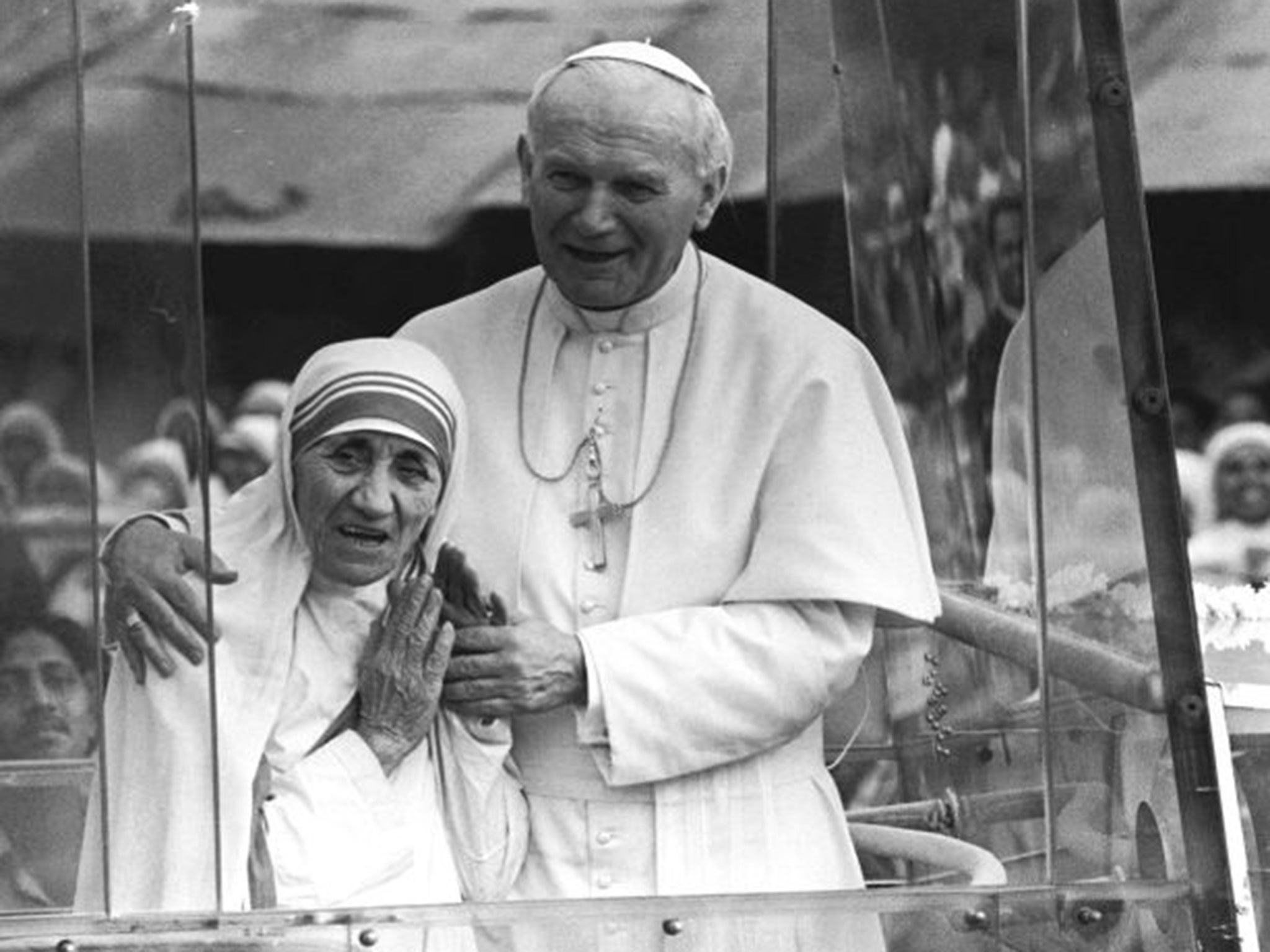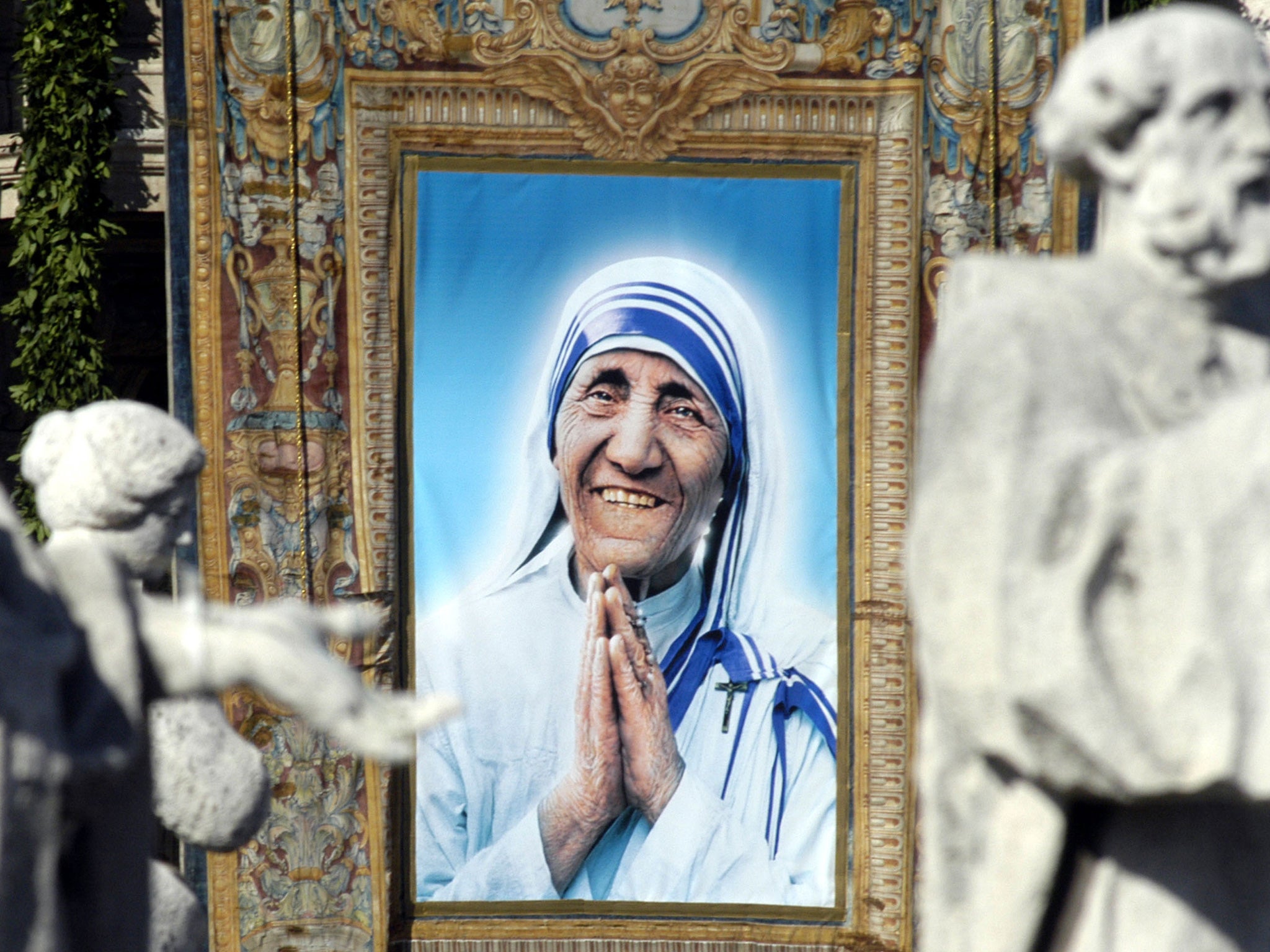Mother Teresa: Why the Catholic missionary is still no saint to her critics
Her reputation was undercut by persistent allegations of misuse of funds and poor medical treatments

Your support helps us to tell the story
From reproductive rights to climate change to Big Tech, The Independent is on the ground when the story is developing. Whether it's investigating the financials of Elon Musk's pro-Trump PAC or producing our latest documentary, 'The A Word', which shines a light on the American women fighting for reproductive rights, we know how important it is to parse out the facts from the messaging.
At such a critical moment in US history, we need reporters on the ground. Your donation allows us to keep sending journalists to speak to both sides of the story.
The Independent is trusted by Americans across the entire political spectrum. And unlike many other quality news outlets, we choose not to lock Americans out of our reporting and analysis with paywalls. We believe quality journalism should be available to everyone, paid for by those who can afford it.
Your support makes all the difference.During an event on 17 December to mark his 79th birthday, Pope Francis attributed a second miracle to Mother Teresa, the late Roman Catholic missionary who has become an international icon for her charitable work. It’s an important move, effectively paving the way for the nun to become a saint, the highest honor bestowed by the Roman Catholic Church.
Among Mother Teresa’s many fans — most of whom view her canonisation as inevitable and perhaps even overdue — the announcement is being met with celebration. However, it will probably also bring new fuel to the difficult and sometimes bitter debate about the merits of Mother Teresa’s charitable work and the nature of her legacy.
In India, where Mother Teresa carried out the majority of her work, that legacy has already been called into question once this year. In February, the head of the Hindu nationalist group Rashtriya Swayamsevak Sangh (RSS) sparked outrage when he criticised her intentions.
“It’s good to work for a cause with selfless intentions. But Mother Teresa’s work had ulterior motive, which was to convert the person who was being served to Christianity,” RSS chief Mohan Bhagwat said at the opening of an orphanage in Rajasthan state, the Times of India reported. “In the name of service, religious conversions were made. This was followed by other institutes, too.”
Bhagwat’s comments caused a storm among opposition politicians, angered by the implication that a woman who won a Nobel Peace Prize for her work in India would have had ulterior motives. Congress Party official Rajiv Shukla demanded an apology, and the newly elected Delhi chief minister, Arvind Kejriwal, said Teresa was a “noble soul” and asked RSS to spare her.

The controversy surrounding Mother Teresa, who died in 1997, is far from new. Her saintly reputation was gained for aiding Calcutta’s poorest of the poor, yet it was undercut by persistent allegations of misuse of funds, poor medical treatments and religious evangelism in the institutions she founded.
In his critique of Mother Teresa, the devoutly Hindu Bhagwat would find an unlikely ally in the work of devoutly atheist Christopher Hitchens. The late British writer became one of the most vocal critics of Mother Teresa in the 1990s, tying his reputation to assailing a woman who was, at the time, an unassailable figure.
In 1994, Hitchens and British Pakistani journalist Tariq Ali wrote an extremely critical documentary on Mother Teresa titled “Hell’s Angel.” You can see it for yourself below.
The documentary, which drew heavily from the account of Aroup Chatterjee, an Indian-born British writer who had worked briefly in one of Mother Teresa’s charitable homes, listed a catalog of criticisms against her. It found fault with the conditions in the facilities of her Missionaries of Charity in Calcutta, which one journalist compared to the photographs she had seen of Nazi Germany’s Bergen-Belsen concentration camp, and Hitchens rallied against what he called the “cult of death and suffering.”
The documentary also argued that Teresa was an “ally of the status quo,” pointing to her relationships with dubious figures all around the world, most notably Haitian dictator Jean-Claude Duvalier and scandal-hit American financier Charles Keating. “She may or may not comfort the afflicted, but she has never been known to afflict the comfortable,” Hitchens explained.
“Hell’s Angel” sparked an international debate, and Hitchens soon followed it up with a pamphlet, unfortunately titled “The Missionary Position,” which repeated and expanded upon his criticisms. As Bruno Maddox put it in a review for the New York Times, Hitchens concluded that Mother Teresa was “less interested in helping the poor than in using them as an indefatigable source of wretchedness on which to fuel the expansion of her fundamentalist Roman Catholic beliefs.”
Hitchens’s critiques of Mother Teresa may come across as polemical, but it’s far from the only criticism. British medical journal the Lancet published a critical account of the care in Mother Teresa’s facilities in 1994, and an academic Canadian study from a couple of years ago found fault with “her rather dubious way of caring for the sick, her questionable political contacts, her suspicious management of the enormous sums of money she received, and her overly dogmatic views regarding, in particular, abortion, contraception, and divorce.” Multiple accounts say that Mother Teresa’s nuns would baptise the dying and that she had a reputation for proselytising. Chatterjee also published his own extremely critical book on Mother Teresa in 2003.
Many who support Mother Teresa dispute these accounts, of course, but they exist and are frequently debated. So far, however, they have failed to move the Roman Catholic Church, and Pope Francis’s announcement suggests that they may never do so. The Italian press is already speculating that Mother Teresa’s canonisation will take place in September 2016, the 19th anniversary of her death.
This post has been updated.
Copyright: Washington Post
Join our commenting forum
Join thought-provoking conversations, follow other Independent readers and see their replies
Comments